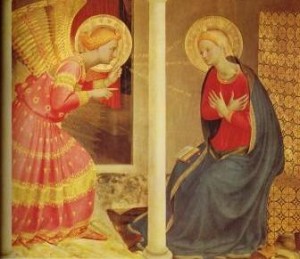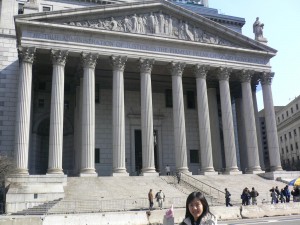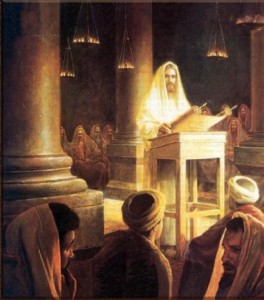
My communion is the Charismatic Episcopal Church (C.E.C.), a convergence movement denomination that attracts clergy and lay people from various Evangelical, Roman Catholic, and Eastern Orthodox backgrounds. We love one another and have as a common goal the knowledge and love of Christ. However, our different backgrounds bring differing perspectives about various theological truths. Mainly truths and issues that have been debated since the Reformation. (Please note that the Historic Church has been in substantial agreement on major doctrines like the Trinity since its beginning.) Therefore, when I attended seminary at Beeson Divinity School, I choose essay topics that would examine these various “problems.” One of my goals in studying at this fine institution was to research and examine these “controversial” theological questions: questions that came up during our many clergy gatherings and friendly poolside debates. One such discussion involved the Blessed Virgin Mary: Was she sinless? Was she assumed into heaven? Did she contribute to our salvation? Was she a model of the church?
My essay, “What Did the Church Fathers Believe About the Blessed Virgin Mary?”, examines these questions in light of the literature of the first six hundred years of church history. I tackle these questions and attempt to draw conclusions about the Patristic period’s understanding of Mary: Did they believe the same as present day Evangelicals, or Roman Catholics, or did the Fathers hold to a different understanding that neither group possesses? Check out my essay and conclude for yourself.
What Did the Church Fathers Believe About the Blessed Virgin Mary?
Rev. Canon Glenn E. Davis
Introduction
No subject stirs passionate emotion between members of the Roman Catholic Church and adherents of Evangelical Protestantism then a discussion about Mary, the Mother of Jesus. Recently, this theological controversy was brought to the forefront again by an article featured in Newsweek magazine. This essay pointed out the vast amount of lay support in the Roman Catholic Church for declaring Mary co-Redemptrix and co-Mediatrix with the Lord Jesus Christ:
This week a large box shipped from California and addressed to “His Holiness, John Paul II” will arrive at the Vatican. The shipping label lists a dozen countries–from every continent but Antarctica–plus a number, 40,383, indicating the quantity of signatures inside. Each signature is attached to a petition asking the pope to exercise the power of papal infallibility to proclaim a new dogma of the Roman Catholic faith: that the Virgin Mary is “Co-Redemptrix, Mediatrix of All Graces and Advocate for the People of God.[1]
The Evangelical world was aghast for it had hoped that the Roman Catholic Church was moderating its position about Mary. Recent ecumenical dialogues with the Roman Catholic theologians had resulted in warm and responsive discussions; Evangelicals looked forward to continued rapprochement. However, Evangelicals were not only grieved that Mary would be elevated to a redeemer status, but also that the doctrine of Papal Infallibility could be invoked in order to establish Mary as a co-Redemptrix and co-Mediatrix with Christ. The mere mention of the concept of infallible Papal authority renewed many old theological anxieties for Evangelicals: tensions, debates, and antagonisms of the Reformation period were renewed. The reaction was immediate and strong from the Billy Graham founded magazine, Christianity Today.
The possibility, however remote, of the pope’s responding to the grassroots groundswell by giving Mary titles that blur the New Testament’s clear vision of Jesus’ unique role in our salvation endangers this uncompromising achievement of clarity [the Evangelicals and Catholics Together Joint Statement on Salvation]. All of which prompts us to say, Don’t. Don’t give to Mary that which belongs to Jesus. Do keep on the road established at Vatican II. [2]
The Roman Catholic Church already has such an official high view of Mary that many Evangelicals feel such that a belief diminishes the centrality of Christ. The Roman Catholic Church presents Mary as the ever-virgin, sinless handmaid, and heavenly intercessor. Rome encourages the faithful in their devotion to Mary:
Mary is the perfect Orans (prayer), a figure of the Church. When we pray to her, we are adhering with her to the plan of the Father, who sends his Son to save all men. Like the beloved disciple we welcome Jesus’ mother into our homes, for she has become the mother of all the living. We can pray with and to her. The prayer of the Church is sustained by the prayer of Mary and united with it in hope.[3]
This statement, and others like it, upset many Evangelicals fearing that the Roman Catholic understanding of Mary distracts from the Lord Jesus Christ’s finished work on the cross, his unique mediatorial position, and his ministry of heavenly intercession. Therefore, the question needs to be asked, “What did the Fathers of the Church believe about Mary, the Mother of Jesus? Did they lay the groundwork for present Roman Catholic doctrine? On the other hand, did the Fathers simply affirm what modern Evangelicals believe today? The purpose of this essay is to answer that question.
[1] Kenneth L. Woodward, “Mary: A Growing Movement in the Roman Catholic Church Wants the Pope to Proclaim a New, Controversial Dogma: That Mary is a Co-Redeemer. Will He Do It, Maybe in Time for the Millennium? Should He?” Newsweek, July 25, 1997 [article-on-line].
[2] David Neff, “Let Mary Be: Why the Pope Shouldn’t Give Mary that which Belongs to Her Son.” Christianity Today, Vol.41, No.14 (December 8, 1997), 14.
[3] Catechism of the Catholic Church, St. Charles Borromeo Catholic Church web site, (http://www.scborromeo.org/ccc/para/2679.htm) 2679.
Read the entire document on Scribd: Mariology in the Early Church





